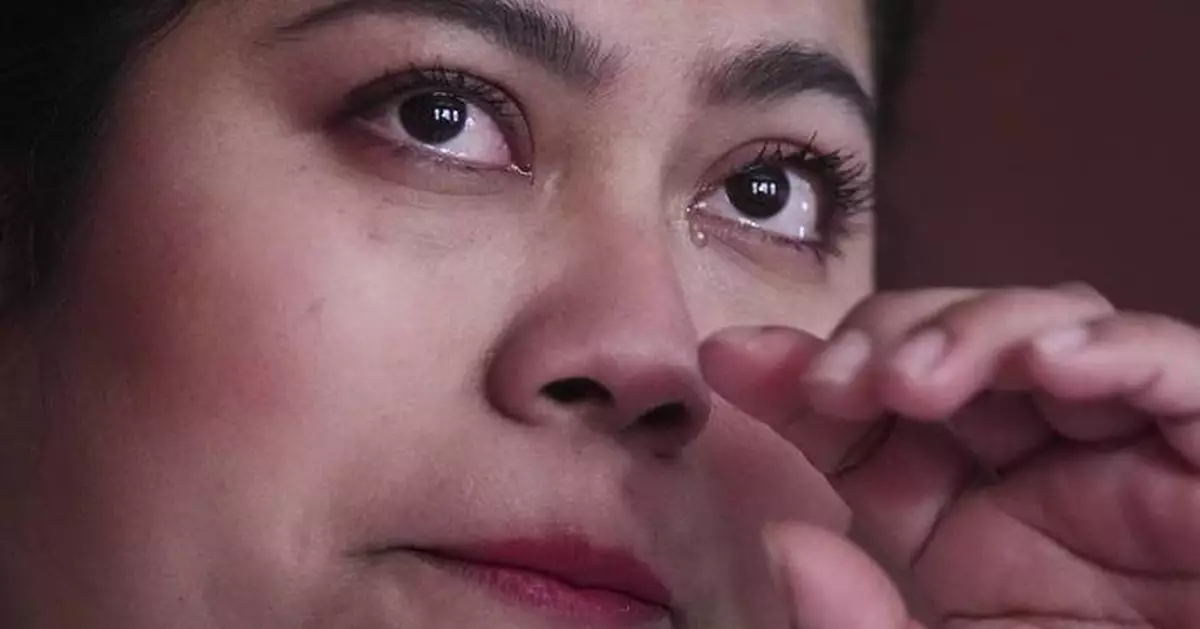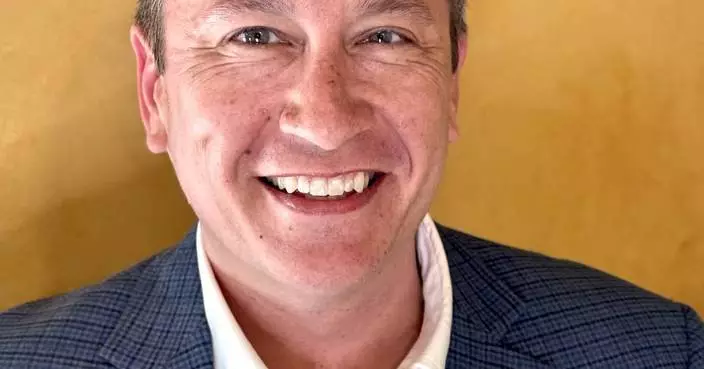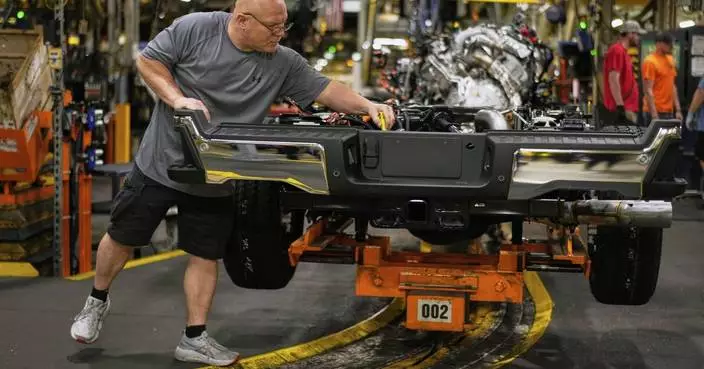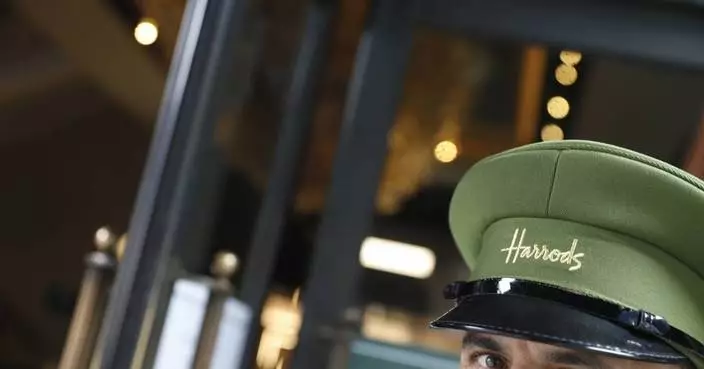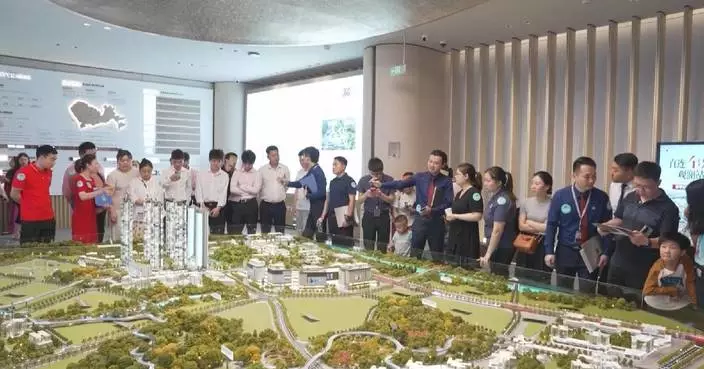NEW BEDFORD, Mass. (AP) — A Massachusetts family is demanding answers from U.S. Immigration and Customs Enforcement, complaining its agents smashed a car window with a hammer and detained a man who they claim had applied for asylum.
A lawyer for the family also claims agents were not looking for Juan Francisco Mendez when they grabbed him Monday in New Bedford, Massachusetts, as he drove to a dental appointment. The lawyer, Ondine Galvez-Sniffin, told The Associated Press during an interview that the agents claimed they were looking for another man with a different name before they dragged him and his wife out of the car.
Click to Gallery
With her eyes filled with tears, Marilu Domingo Ortiz, whose husband was taken into custody by ICE agents after they smashed a window of their family car, describes the arrest during an interview at their home, Wednesday, April 16, 2025, in New Bedford, Mass. (AP Photo/Charles Krupa)
A school bus rolls through a neighborhood near where ICE officers took a man into custody after breaking the window of the family car, Wednesday, April 16, 2025, in New Bedford, Mass. (AP Photo/Charles Krupa)
Marilu Domingo Ortiz, whose husband was taken into custody by ICE agents after they smashed a window of their family car, looks at broken glass and damage to their vehicle at their home, Wednesday, April 16, 2025, in New Bedford, Mass. (AP Photo/Charles Krupa)
Marilu Domingo Ortiz, whose husband was taken into custody by ICE agents after they smashed a window of their family car, talks on her phone at their home, Wednesday, April 16, 2025, in New Bedford, Mass. (AP Photo/Charles Krupa)
Marilu Domingo Ortiz, whose husband was taken into custody by ICE agents after they smashed a window of their family car, pauses while describing the arrest during an interview at their home, Wednesday, April 16, 2025, in New Bedford, Mass. (AP Photo/Charles Krupa)
Marilu Domingo Ortiz, whose husband was taken into custody by ICE agents after they smashed a window of their family car, shows a photograph of her spouse, Juan Francisco Mendez, at their home, Wednesday, April 16, 2025, in New Bedford, Mass. (AP Photo/Charles Krupa)
While wiping away a tear, Marilu Domingo Ortiz, whose husband was taken into custody by ICE agents after they smashed a window of their family car, describes the arrest during an interview at their home, Wednesday, April 16, 2025, in New Bedford, Mass. (AP Photo/Charles Krupa)
The incident, recorded on video by Mendez's wife Marilu Domingo Ortiz, shows ICE agents using a hammer to smash the car window and then seize Ortiz. The family believes Mendez is being held at a facility in Dover, New Hampshire.
“When I arrived on the scene, my client's wife was sobbing. She was crying. She was shaking,” Galvez-Sniffin said, adding that Mendez yelled “Help Me” in Spanish as he was driven away in handcuffs.
“I walked over to the car and I see the busted window, the glass all over the back seat, and I was shocked,” the lawyer added. “I’ve been doing immigration work for 27 years and this was the first time that I saw such violent drastic measures being taken.”
A spokesperson for ICE did not return repeated messages seeking comment.
Another lawyer for Mendez, Ryan Sullivan, said a federal judge in New Hampshire ruled Wednesday that the government must give his attorneys 72 hours notice before moving him anywhere. Sullivan believes that is enough time to determine next steps in his case.
Ortiz and her 9-year-old son have already been given protection under an asylum status over fears of facing persecution if they returned home to Guatemala. Mendez was in the process of applying for what is called derivative asylum, where you can get asylum if a family member already has it.
The woman said she felt “scared” when ICE broke into their car and never expected someone from her family would be detained like this.
“We came here to do honest work. To fight for our family," Ortiz said through a translator. "What they did, or what they’re doing right now, no, it’s not fair. We don’t deserve that treatment.”
Ortiz said she was worried about the toll the detention was taking, especially on her son.
“He has already stopped eating because of what we’re going through," she said. “I just hope that they release my husband so he can come back with us and that my son can be with him as well.”
New Bedford Mayor Jon Mitchell, in a post on X, said the incident “raises questions that require clear answers," including why local police weren't alerted beforehand. He also questioned whether ICE agents are targeting criminals as the Trump administration promised or, rather, “engaging in an indiscriminate round-up of individuals with uncertain immigration status.”
Galvez-Sniffin said Mendez had been in the country for four years and worked in the seafood industry in New Bedford. He had no criminal record, she said, and was in the process of applying for asylum. He had been fingerprinted in December, she said, adding nothing turned up in terms of a criminal record.
“There really was no reason to treat him the way that he and his wife were treated.” Galvez-Sniffin said, adding that agents refused to look at the paperwork showing he had applied for asylum.
“My biggest concern, his family's biggest concern is getting him back,” she said. “He has no criminal background and everything to stay for in this country.”
The incident comes as the governor and law enforcement officials in New England have raised concerns about the tactics ICE is using to detain people.
Last month, ICE agent Brian Sullivan took Wilson Martell-Lebron, 49, into custody as he was leaving court. Boston Municipal Court Judge Mark Summerville found Sullivan in contempt, arguing that he deprived Martell-Lebron of his rights to due process and fair trial.
That case has since been dropped but the detention outside court while Martell-Lebron was on trial prompted Suffolk County District Attorney Kevin Hayden to call the actions of ICE “troubling and extraordinarily reckless.”
Tufts University student Rumeysa Ozturk of Turkey, 30, is also challenging her detention by ICE. A video account shows her walking on a street in a Boston suburb as she is surrounded by immigration officials. Ozturk is heard screaming as they take her cellphone and is seen getting handcuffed. Her lawyers have called for her immediate release.
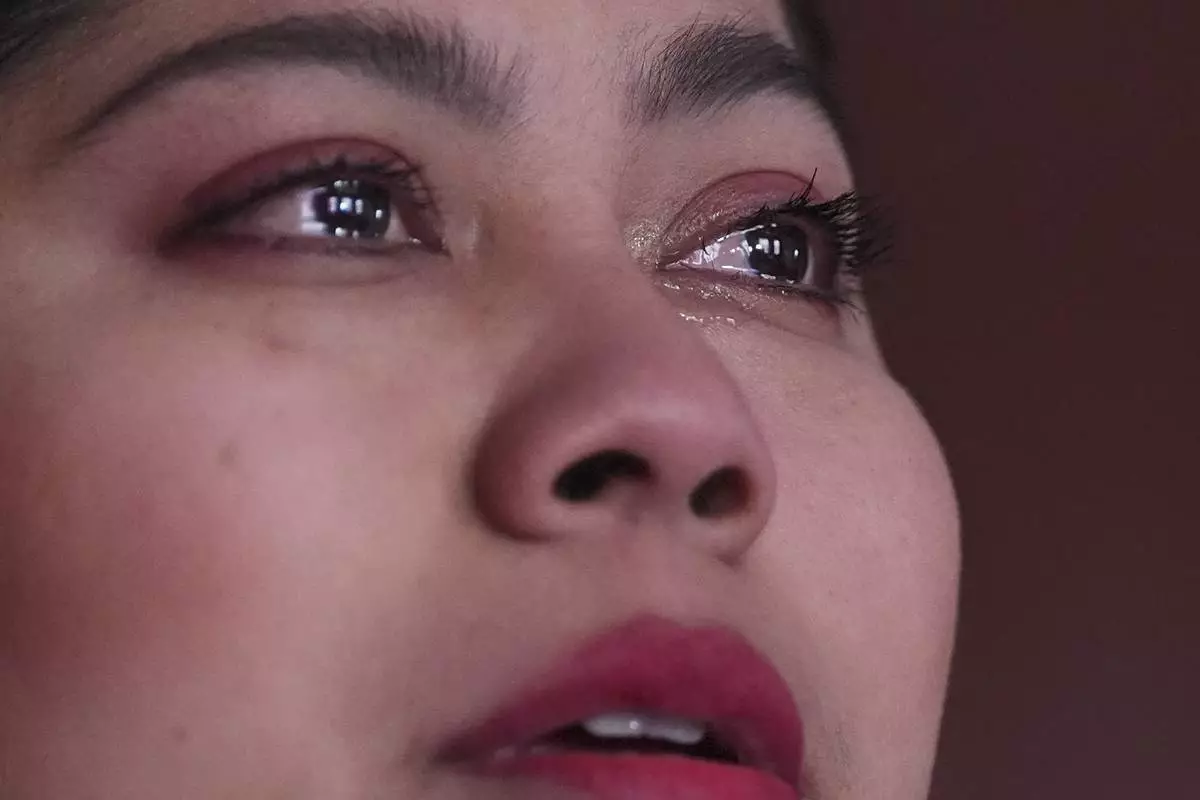
With her eyes filled with tears, Marilu Domingo Ortiz, whose husband was taken into custody by ICE agents after they smashed a window of their family car, describes the arrest during an interview at their home, Wednesday, April 16, 2025, in New Bedford, Mass. (AP Photo/Charles Krupa)
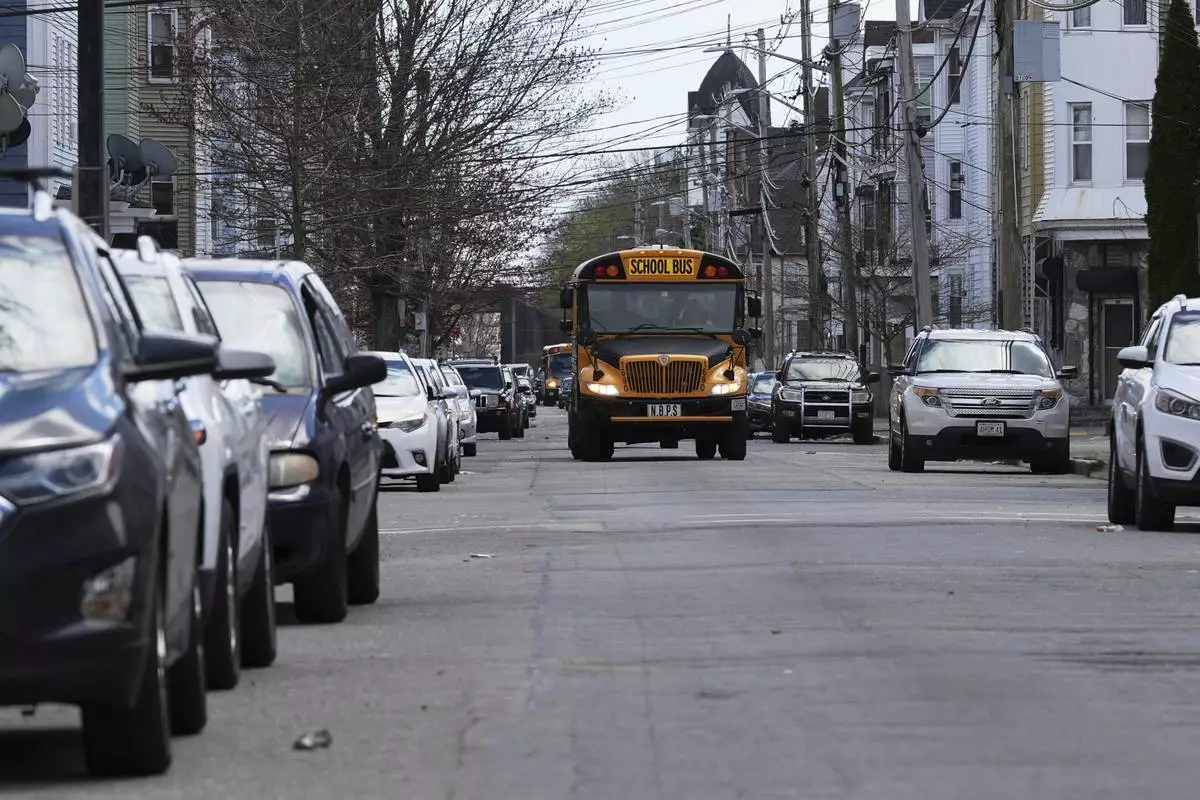
A school bus rolls through a neighborhood near where ICE officers took a man into custody after breaking the window of the family car, Wednesday, April 16, 2025, in New Bedford, Mass. (AP Photo/Charles Krupa)
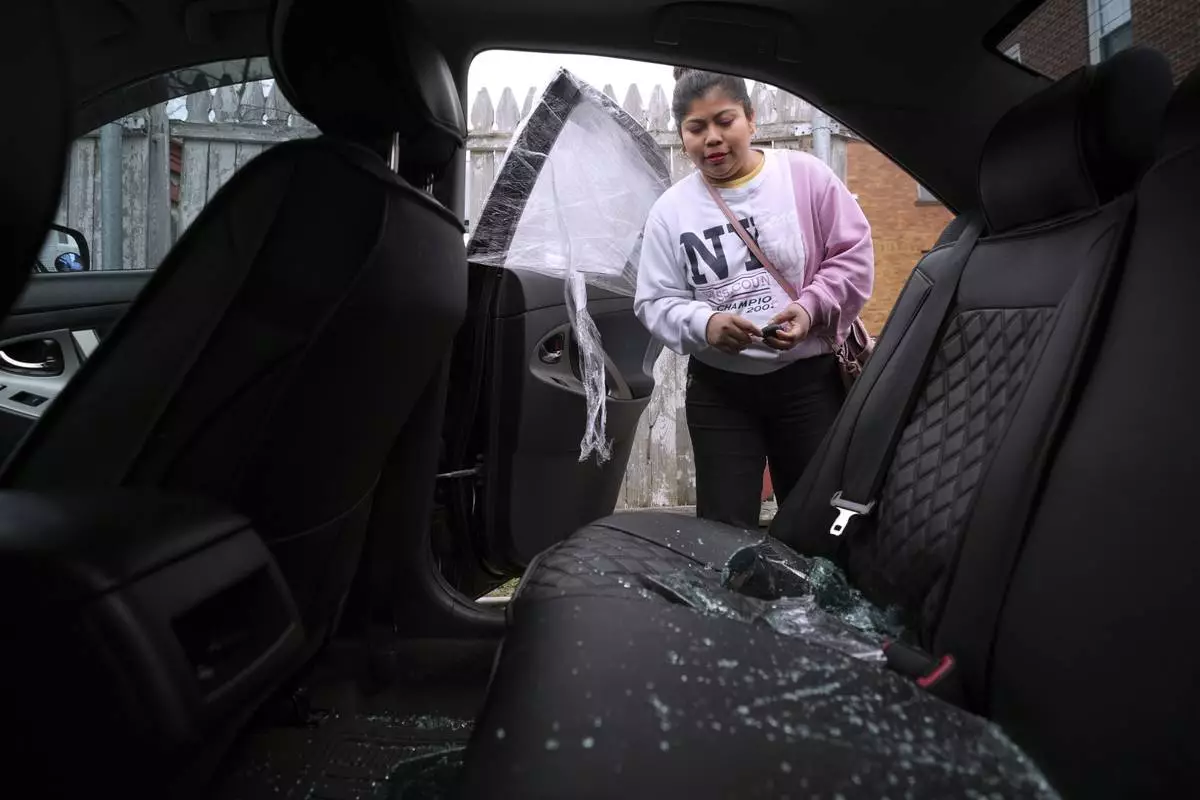
Marilu Domingo Ortiz, whose husband was taken into custody by ICE agents after they smashed a window of their family car, looks at broken glass and damage to their vehicle at their home, Wednesday, April 16, 2025, in New Bedford, Mass. (AP Photo/Charles Krupa)
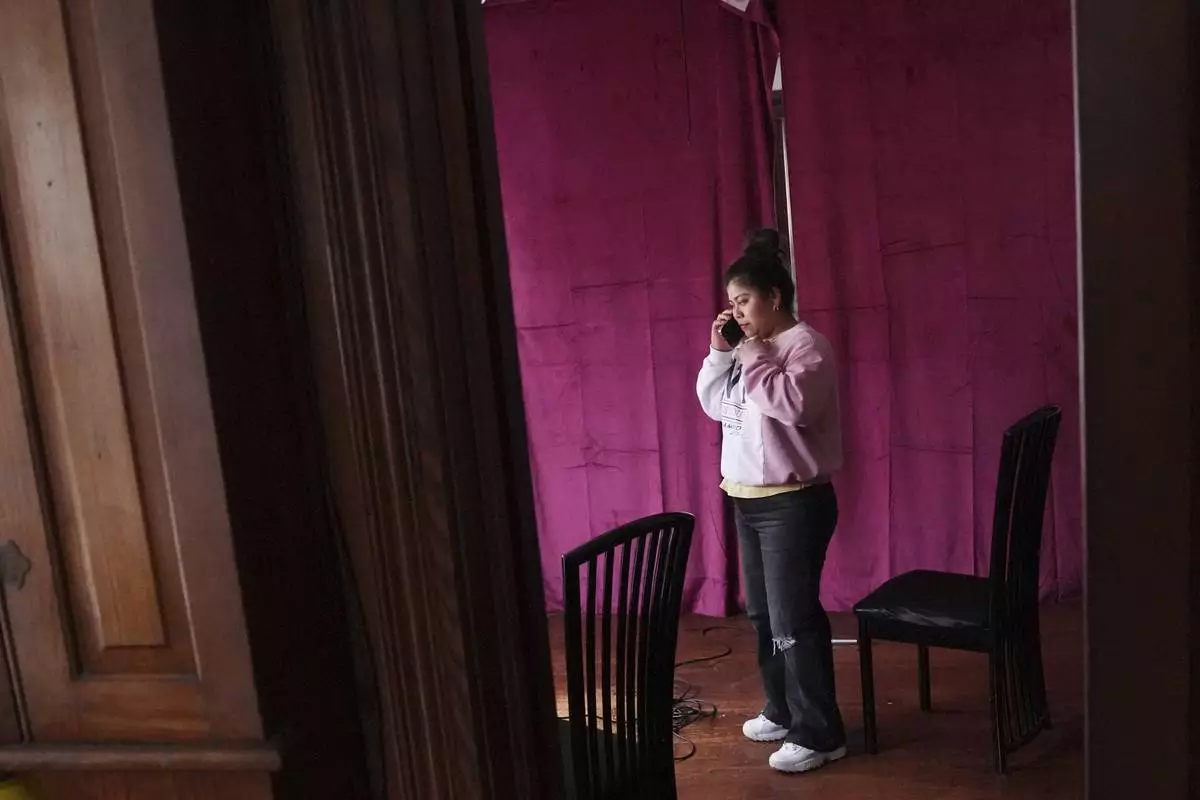
Marilu Domingo Ortiz, whose husband was taken into custody by ICE agents after they smashed a window of their family car, talks on her phone at their home, Wednesday, April 16, 2025, in New Bedford, Mass. (AP Photo/Charles Krupa)
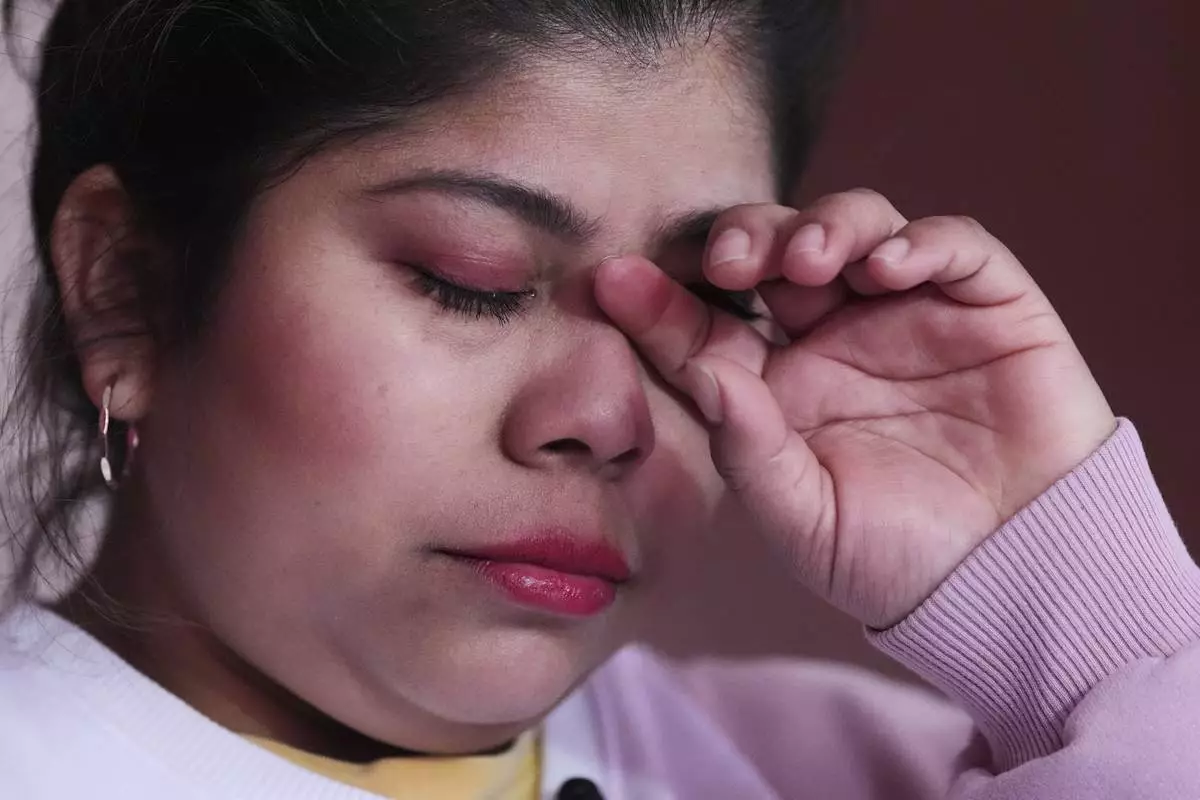
Marilu Domingo Ortiz, whose husband was taken into custody by ICE agents after they smashed a window of their family car, pauses while describing the arrest during an interview at their home, Wednesday, April 16, 2025, in New Bedford, Mass. (AP Photo/Charles Krupa)
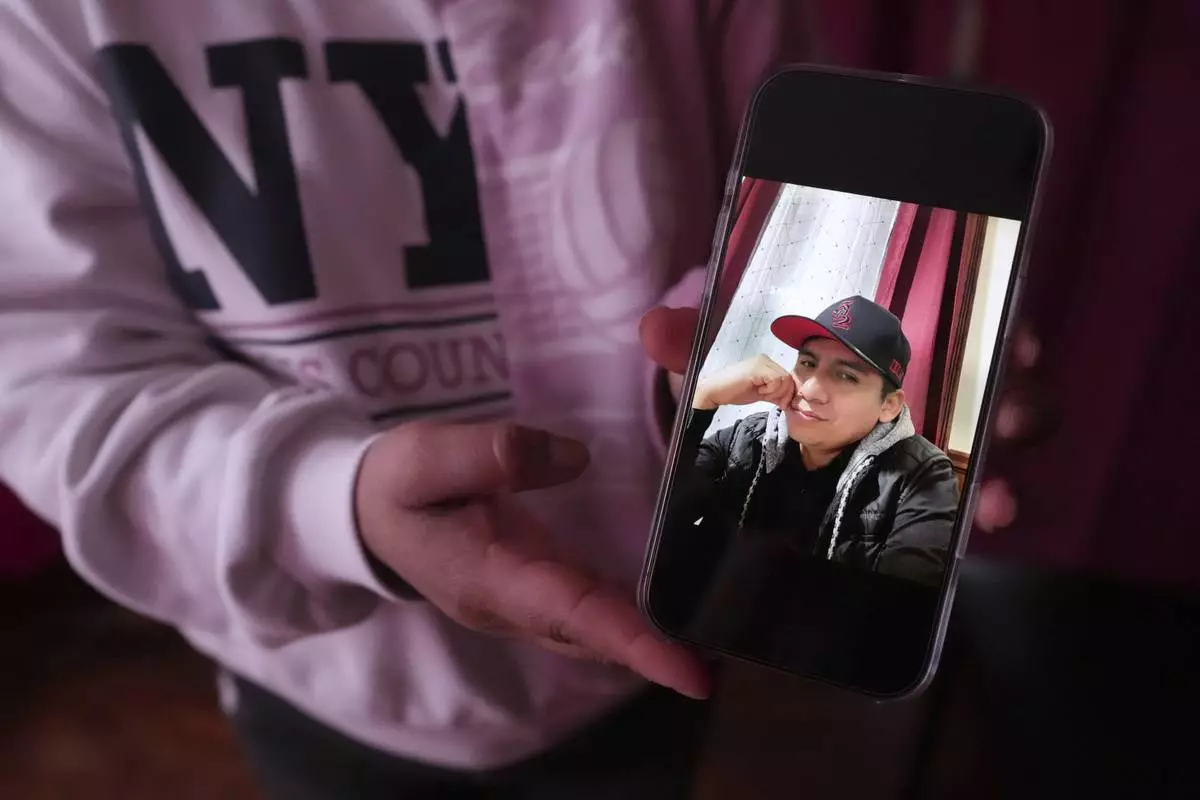
Marilu Domingo Ortiz, whose husband was taken into custody by ICE agents after they smashed a window of their family car, shows a photograph of her spouse, Juan Francisco Mendez, at their home, Wednesday, April 16, 2025, in New Bedford, Mass. (AP Photo/Charles Krupa)
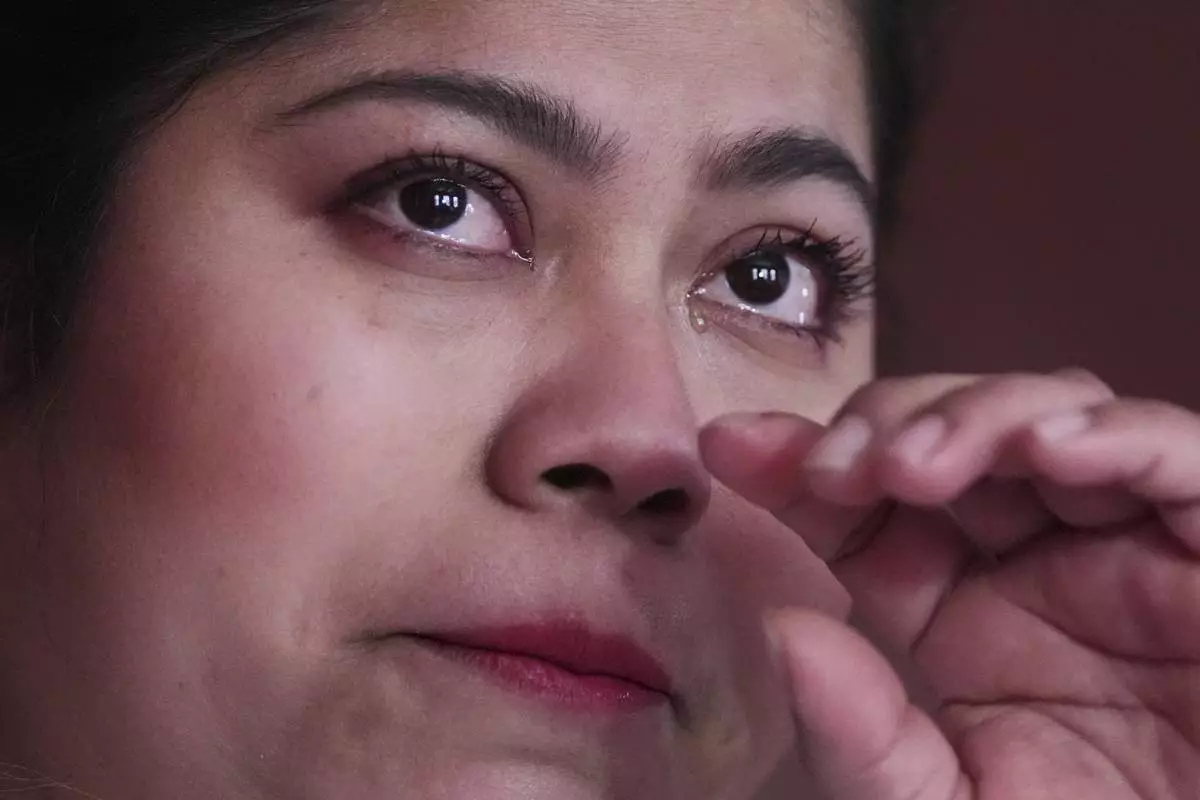
While wiping away a tear, Marilu Domingo Ortiz, whose husband was taken into custody by ICE agents after they smashed a window of their family car, describes the arrest during an interview at their home, Wednesday, April 16, 2025, in New Bedford, Mass. (AP Photo/Charles Krupa)
CAXIUANA NATIONAL FOREST, Brazil (AP) — Deep in silence, as if under a spell, children watch intently as Bacuri, a young Amazonian manatee, glides around a small plastic pool. When he surfaces for air, some of them exchange wide smiles. The soft rustle of rainforest leaves punctuated by bird song adds to the magic of the moment.
The children from riverside communities traveled for hours by boat just to meet Bacuri at the field station of the Emilio Goeldi Museum, Brazil’s oldest research institute in the Amazon. Despite their endangered status, manatees are still hunted and their meat illegally sold, and they are increasingly threatened by climate change. Environmentalists hope that by engaging local communities, Bacuri and others like him will be spared.
The Amazonian manatee is the region’s largest mammal but is rarely seen, much less up close. The reasons for this are twofold: The manatee has acute hearing and will vanish into the murky water at the slightest sound; and its population has dwindled after being overhunted for hundreds of years, mostly for its tough hides that were exported to Europe and Central America.
To help the manatee population recover, several institutions are rescuing orphaned manatee calves, rehabilitating them and reintroducing them to the wild.
Bacuri weighed just 22 pounds (10 kilograms) — a fraction of the more than 900 pounds (400 kilograms) of an adult manatee — when he was rescued and taken to the museum's research center in the federally protected Caxiuana National Forest. He was named after the local community that found him. Two years and several thousand milk bottles later, Bacuri has grown to about 130 pounds (60 kilos).
Three institutions are responsible for his care. The Goeldi Museum provides facilities and educates nearby communities. The federal Chico Mendes Institute for Biodiversity Conservation assigns two staffers for 15-day shifts to feed Bacuri three bottles of milk a day as well as chopped beets and carrots, and clean the pool every 48 hours. The nonprofit Instituto Bicho d'Agua— meaning institute of water animals in Portuguese — oversees veterinary care, dietary planning and caregiver training.
During their visit, the children learn that female manatees are pregnant for about a year then nurse their young for two more, feeding them from nipples behind their front flippers — the manatee equivalent of armpits. This long reproductive cycle is one reason the manatee population has not recovered from the commercial hunting that persisted until the mid-20th century.
They also learn the species is endangered and that they are the ones who must protect it.
“You are the main guardians,” biologist Tatyanna Mariúcha, head of the scientific base, tells the children, who spend the rest of the day drawing and making Play-Doh models of Bacuri.
With its auditorium, dormitories, observation towers, cafeteria and laboratories, the research station — two hours by speedboat from Portel, the nearest city — stands in stark contrast to nearby communities comprising clusters of wooden houses on stilts where families rely on cassava farming, fishing and harvesting açaí berries. School field trips and community outreach aim to narrow the gap.
“Caxiuana is their home,” Mariúcha told The Associated Press. “We can’t just come here and do things without their consent.”
Local knowledge will play a key role when Bacuri is finally released. He is the only manatee calf under care at Caxiuana. Once he has fully transitioned to a plant-based diet, he’ll spend time in a river enclosure before his release. That site will be selected based on where residents say wild manatees feed and pass through.
If all goes as planned, Bacuri will be the first released in the Caxiuana area. Two other calves rescued in poor health died in captivity, a sadly common outcome.
While subsistence hunting isn’t a major threat to the species, some fishermen still sell manatee meat illegally in nearby towns. Brazil banned hunting of all wild animals in 1967, with two exceptions: Indigenous peoples are allowed to hunt, and others can kill a wild animal to satisfy the hunger of the hunter or his family.
The threat of hunters has become harder to manage due to climate change, said Miriam Marmontel, a senior researcher at the Mamirauá Institute for Sustainable Development, hundreds of miles (kilometers) upstream along the Amazon River.
Dozens of dolphins died near Mamiraua in 2023, likely due to soaring water temperatures during a historic drought. Manatees avoided mass mortality then because they typically inhabit deep pools during the dry season, but recent droughts have dramatically reduced the water level, making manatees more vulnerable to poachers.
“As climate change accelerates, manatees may begin to suffer from heat stress too,” Marmontel said. “They also have a thermal limit, and eventually it may be crossed.”
That’s why reintroduction efforts are so important.
Around 60 rescued manatees are being cared for across the state of Para, where Caxiuana is located. Bicho d’Agua is caring for four in partnership with the Federal University of Para and Brazil's environmental agency. One of the four, named Coral, was found near Óbidos and airlifted 620 miles (1,000 kilometers) to the institute's facility in Castanhal. She arrived dehydrated and with severe skin burns, likely from sun exposure.
“The population has declined so much that every hunted animal impacts the species,” Renata Emin, president of Bicho d’Agua, told AP. “That’s why any effort matters, not just because one individual may return to the wild and help rebuild the population but because of the community and government engagement it inspires.”
The Associated Press’ climate and environmental coverage receives financial support from multiple private foundations. AP is solely responsible for all content. Find AP’s standards for working with philanthropies, a list of supporters and funded coverage areas at AP.org.
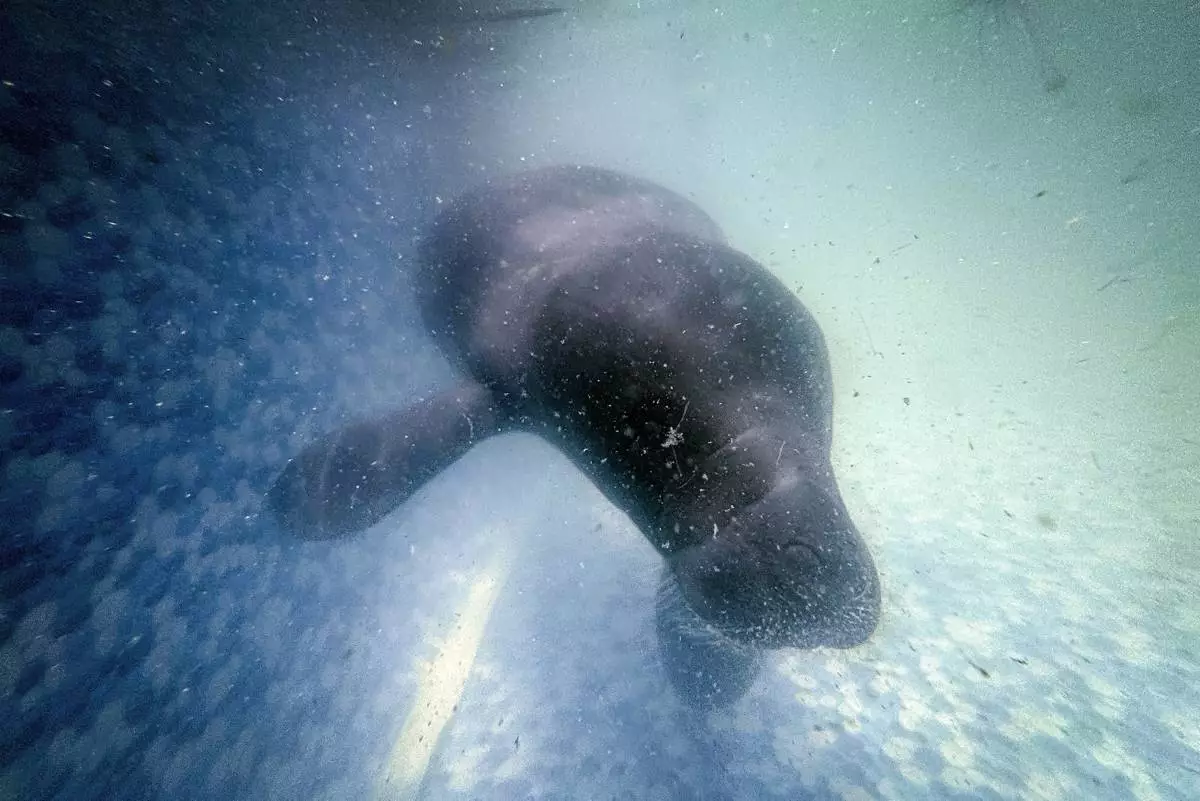
Maria, a rescued manatee, swims in a pool at the Bicho d'Agua project facilities in Castanhal, Brazil, Sunday, March 23, 2025. (AP Photo/Jorge Saenz)
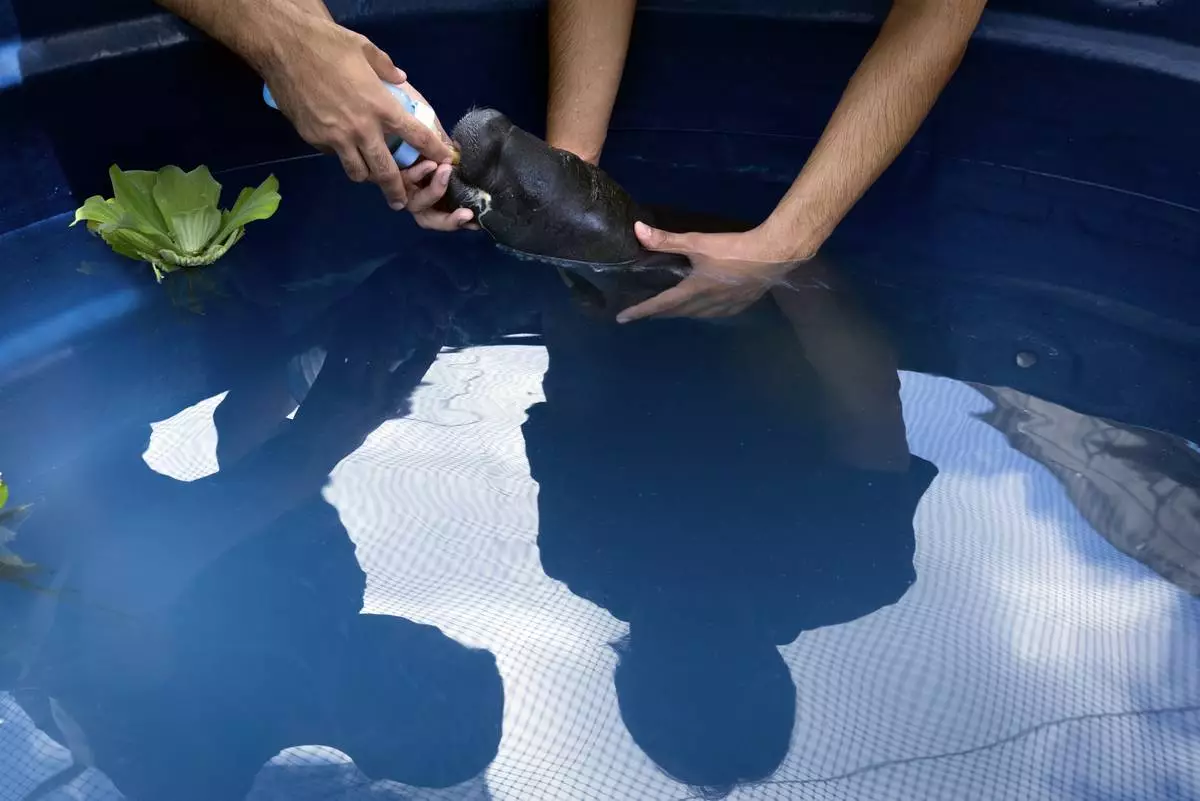
Coral, a rescued manatee, is fed while in a pool at the Bicho d'Agua project facilities in Castanhal, Brazil on Sunday, March 23, 2025. (AP Photo/Jorge Saenz)
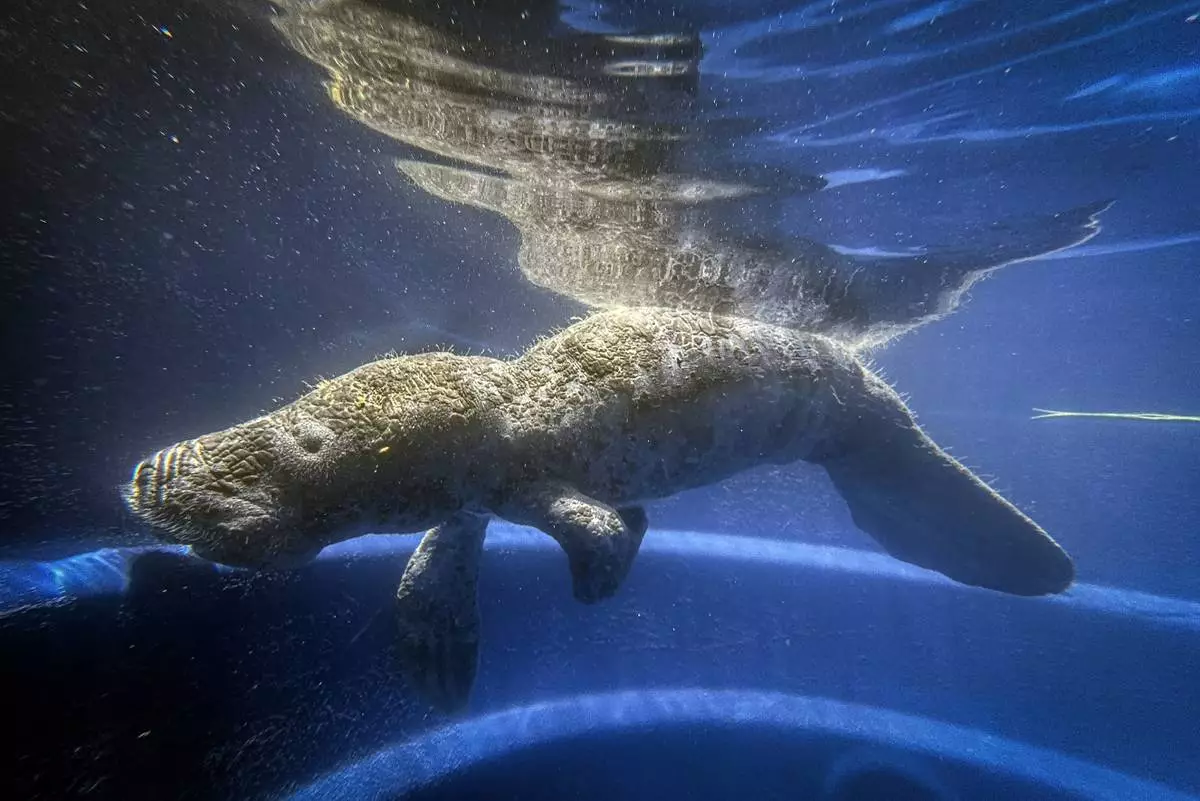
Coral, a rescued manatee, swims in a pool at the Bicho d'Agua project facilities in Castanhal, Brazil, Sunday, March 23, 2025. (AP Photo/Jorge Saenz)
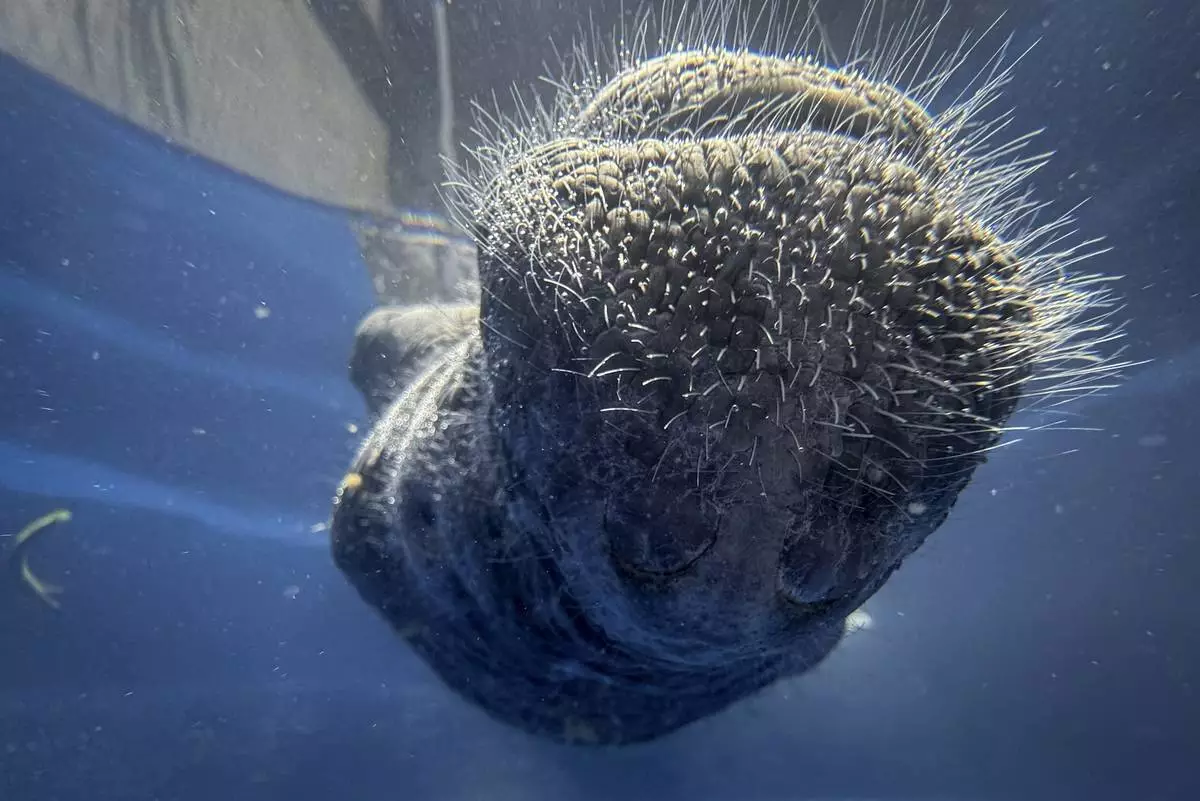
Coral, a rescued manatee, sleeps belly up in a pool at Bicho d'Agua project facilities in Castanhal, Brazil, Sunday, March 23, 2025. (AP Photo/Jorge Saenz)
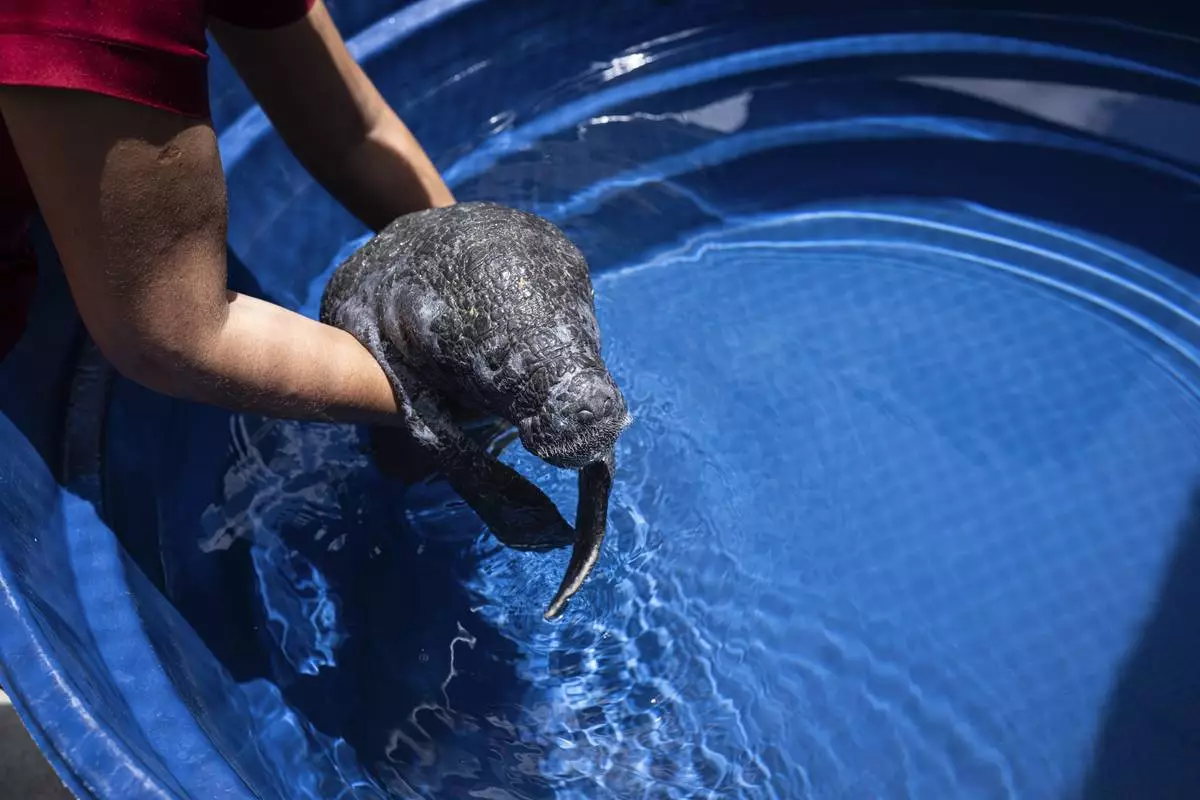
Coral, a rescued manatee, receives healing cream from an assistant at a pool at Bicho d'Agua project facilities in Castanhal, Brazil, Sunday, March 23, 2025. (AP Photo/Jorge Saenz)
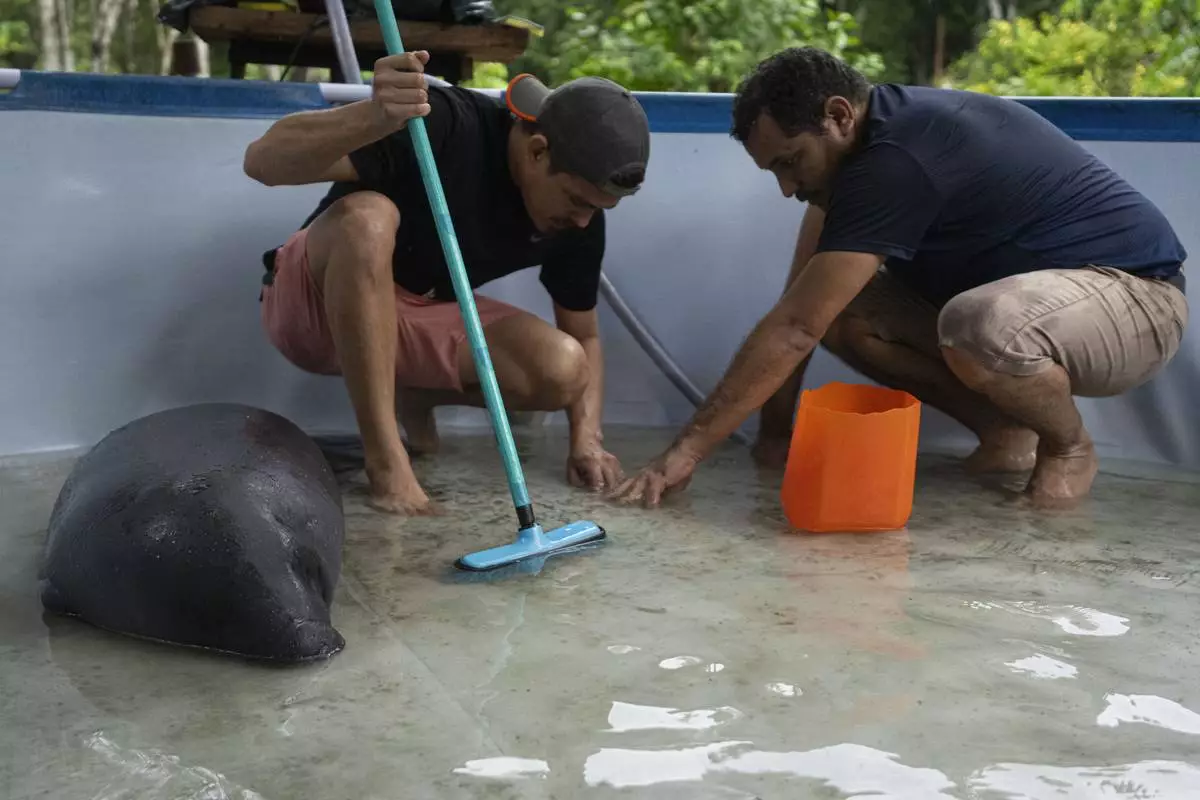
Workers clean a pool near Bacuri, a rescued manatee, at the Emilio Goeldi Museum's scientific station in Para state, Brazil, Thursday, March 20, 2025. (AP Photo/Jorge Saenz)
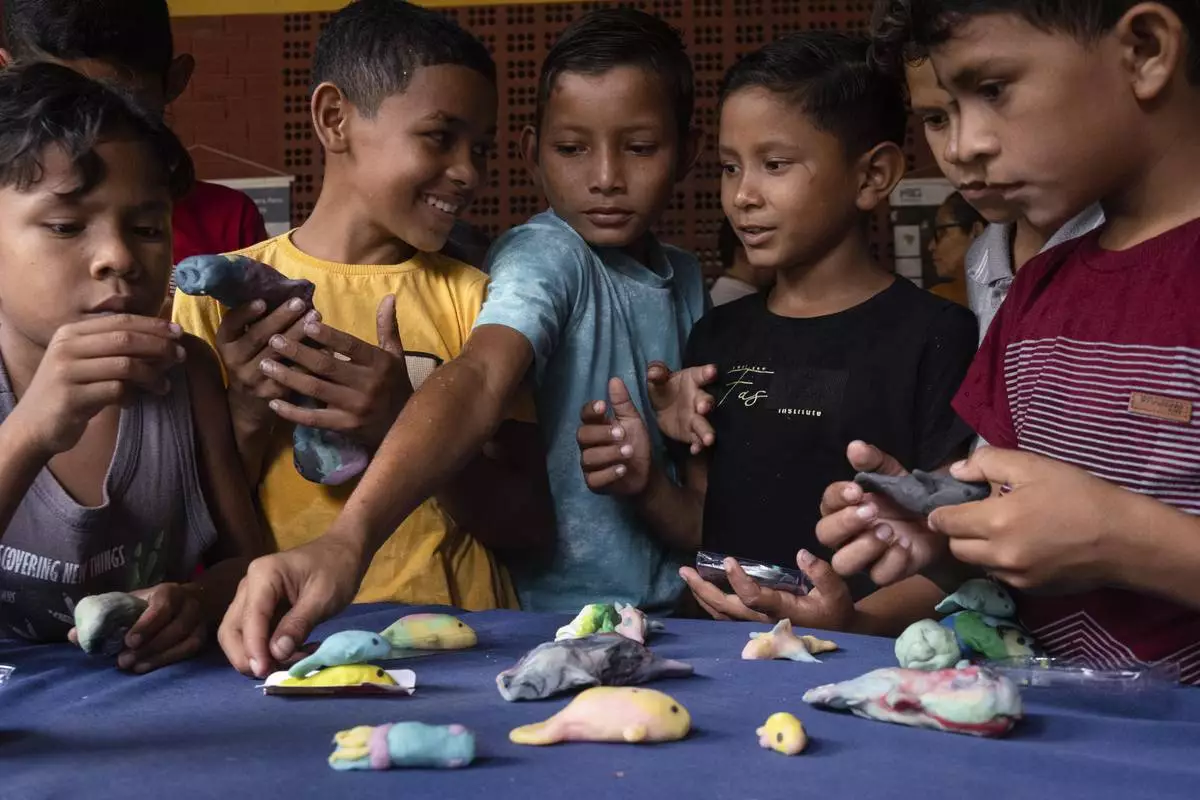
Children make manatee models out of Play-Doh during a trip to Emilio Goeldi Museum's scientific station in Para state, Brazil, Friday, March 21, 2025. (AP Photo/Jorge Saenz)
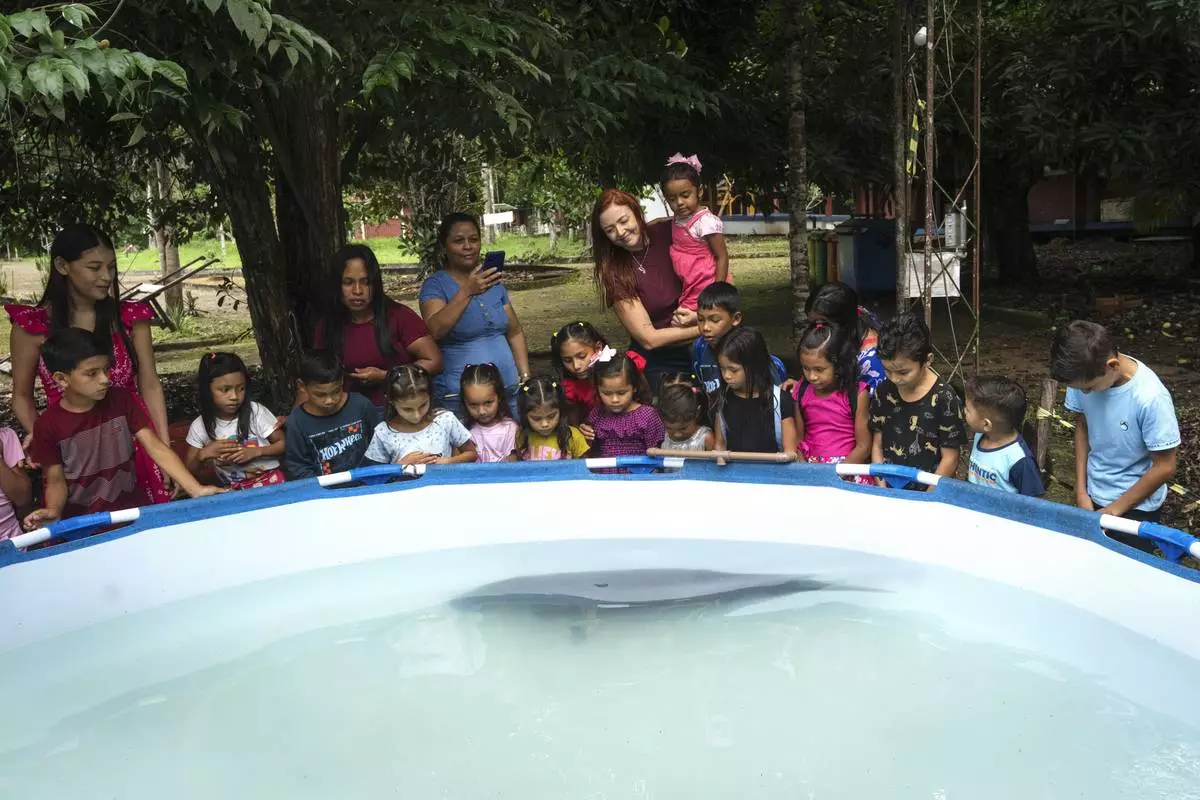
Bacuri, a rescued manatee, swims as children observe in the Emilio Goeldi Museum's scientific base at Caxiuana National Forest in Para state, Brazil, Friday, March 21, 2025. (AP Photo/Jorge Saenz)

A girl embraces biologist Tatyanna Mariúcha, head of the Emilio Goeldi Museum's scientific base, as children arrive at the station in the Caxiuana National Forest in Para state, Brazil, Friday, March 21, 2025. (AP Photo/Jorge Saenz)
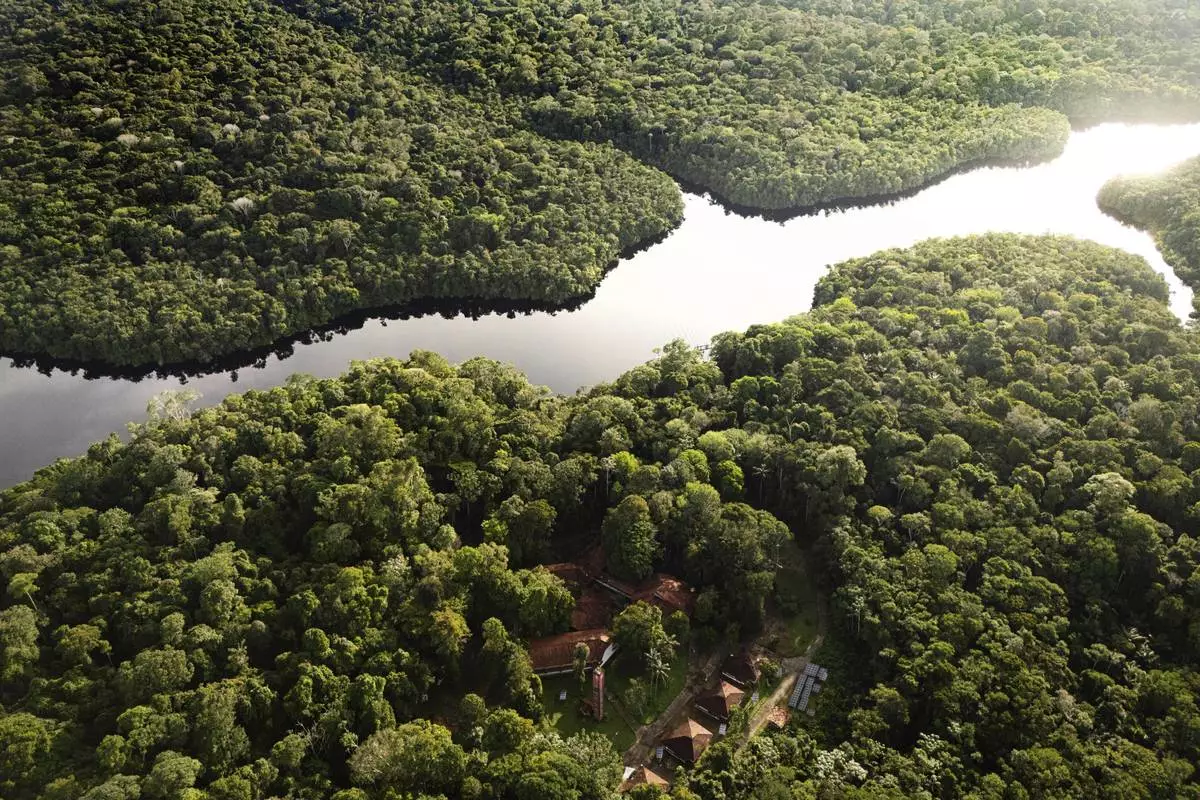
The Curua River crosses the Caxiuana National Forest with Emilio Goeldi Museum's scientific station at bottom in Para state, Brazil, Saturday, March 22, 2025. (AP Photo/Jorge Saenz)
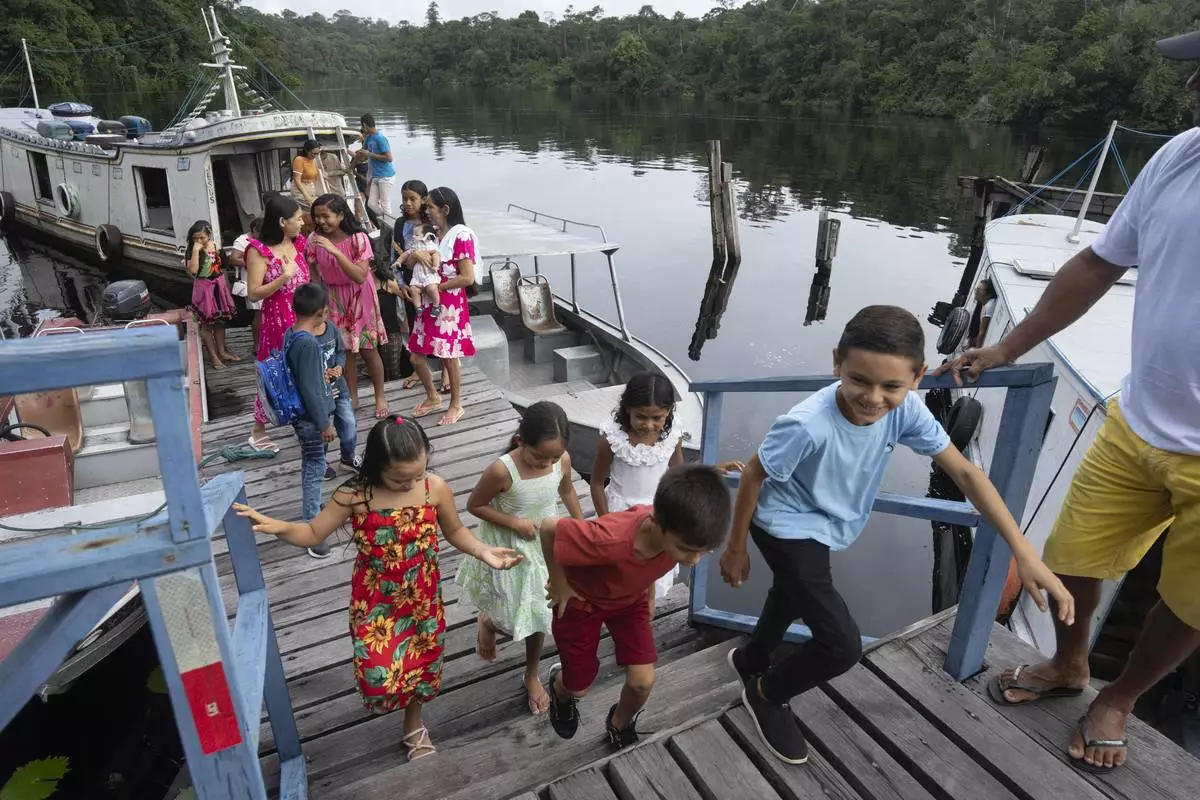
Children arrive at the Emilio Goeldi Museum's scientific station in the Caxiuana National Forest in Para state, Brazil, Friday, March 21, 2025. (AP Photo/Jorge Saenz)
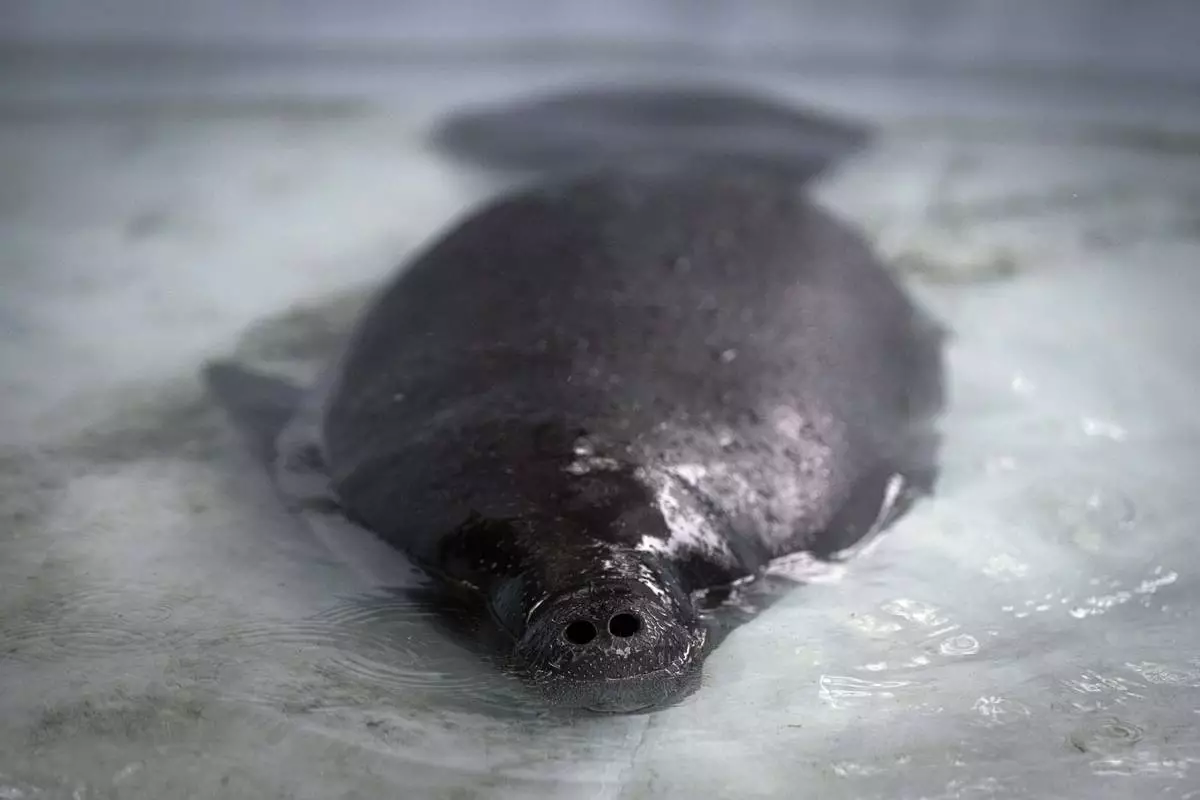
Bacuri, a rescued manatee, breathes while swimming in a pool at the Emilio Goeldi Museum's scientific station in the Caxiuana National Forest in Para state, Brazil, Thursday, March 20, 2025. (AP Photo/Jorge Saenz)









